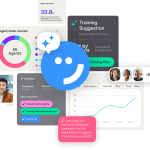As a CEO or executive, you're tasked with harnessing AI to propel your business forward. This article unveils how to integrate AI-driven models in 2025, blending practical strategies with real-world cases. Discover why swift action is critical and how to lead your team through this shift. Read on to shape your company's future.
Artificial intelligence is reshaping the corporate landscape, turning possibilities into realities. From optimizing supply chains to tailoring customer experiences, AI is a game-changer for businesses aiming to thrive in 2025. For leaders like you, the challenge lies in strategically embedding AI to outpace competitors.
This piece explores actionable steps to adopt AI-driven business models, supported by industry examples and expert insights. Let's dive into how you can steer your organization toward an AI-powered future.
AI's Strategic Imperative for Leaders
The case for AI is compelling: it's a catalyst for efficiency and innovation. According to PwC's 28th Annual Global CEO Survey, 87% of Indian CEOs anticipate economic growth driven by AI, while German CEOs remain cautious due to supply chain bottlenecks. This split underscores a vital truth—AI's potential is immense, but its application must be tailored. Take CN Rail, where CEO Tracy Robinson has leveraged AI to streamline supply chains, enhancing speed and sustainability. As a leader, you must pinpoint where AI can transform your operations, whether it's refining logistics or enabling customers to browse a collection of dupe fragrances inspired by luxury scents. These high-quality, affordable alternatives, crafted with AI-driven insights to meet consumer preferences, showcase how personalization can elevate customer engagement for fragrance enthusiasts and luxury shoppers alike.
Start by exploring AI's role in decision-making. Tools like executive dashboards deliver real-time insights, enabling you to seize market opportunities swiftly. Retail leaders, for instance, use AI to forecast trends, while energy firms optimize renewable transitions. The first step is an audit of your processes to identify AI's potential impact—perhaps automating repetitive tasks or enhancing analytics. Cultivating a culture open to experimentation is equally crucial. Encourage your team to test AI solutions, learning from small-scale trials to build confidence and momentum.
Breaking Down Barriers to AI Adoption
Adopting AI isn't seamless. High costs, skill shortages, and fear of disruption often deter executives. Yet, PwC notes that leaders who scale AI rapidly see productivity surges. IBM's 2024 CEO Study found that abandoning outdated practices, like reliance on traditional analytics, unlocks AI's full value. To ease adoption, begin with a pilot project. A retail firm might deploy AI to personalize promotions, boosting sales and proving the technology's worth. This incremental approach builds internal support and minimizes risk.
Talent is another hurdle. Korn Ferry's 2025 Workforce Survey reveals 78% of executives see AI enhancing their value, but only with skilled teams. Invest in training programs to close this gap. Workshops on AI tools, as Korn Ferry suggests, empower employees to embrace innovation. Ethical considerations also demand attention. Transparent data use—whether for customer insights or operational tweaks—builds trust, aligning with the ethical focus valued by CEO Today readers. By tackling these challenges proactively, you lay the groundwork for lasting AI integration.
Leading with Vision and Humanity
AI's technical prowess often overshadows its human side, but leadership hinges on inspiring your team. Storytelling is a powerful tool to bridge this gap. The CEO Magazine highlights how narratives align teams around AI goals. Consider Satya Nadella, whose personal stories about AI's potential galvanized Microsoft's workforce, boosting morale and market value. You can similarly rally your organization by showcasing AI's impact on customers, like using predictive tools to enhance personalization in retail or streamline operations.
Your external presence matters too. Page Executive notes that CEOs like Richard Branson use LinkedIn to share AI's transformative effects, fostering stakeholder trust. Engage your audience by posting about your AI journey—highlight a successful pilot or measurable outcome. Encourage employees to amplify this narrative, creating a cohesive story that resonates with customers and investors. This approach not only showcases your leadership but also positions your brand as a pioneer in an AI-driven world.
Accelerating AI for Competitive Edge
Speed is the linchpin of AI success. PwC's survey emphasizes that innovators who act swiftly dominate markets, even if their initial scale is modest. Prioritize one or two high-impact AI projects, such as predictive analytics or automated customer service. Work closely with your CIO to align these initiatives with financial goals, as Global CEO Magazine advises. For example, a tech firm might use AI to minimize downtime, while a retailer could optimize inventory management—both demand rapid execution to maintain an edge.
Partnerships amplify AI's impact. CN Rail's collaborations with ports and warehouses demonstrate how alliances enhance AI-driven efficiency. Seek partners who complement your strengths, such as tech providers or industry peers. Maintain a balance of optimism and pragmatism—AI isn't a cure-all, but it can redefine your business model when guided by clear priorities. By acting decisively and leveraging external expertise, you position your organization to lead in 2025's dynamic landscape.
Seize the AI Opportunity
Your ability to navigate AI's complexities will define your legacy. AI offers unparalleled tools to drive efficiency, innovation, and customer satisfaction, but only if you act with purpose. By starting small, upskilling your team, and weaving compelling narratives, you can transform your business model while inspiring those around you. The clock is ticking—competitors are already moving. Embrace AI now to lead your organization into a bold, AI-driven future.













